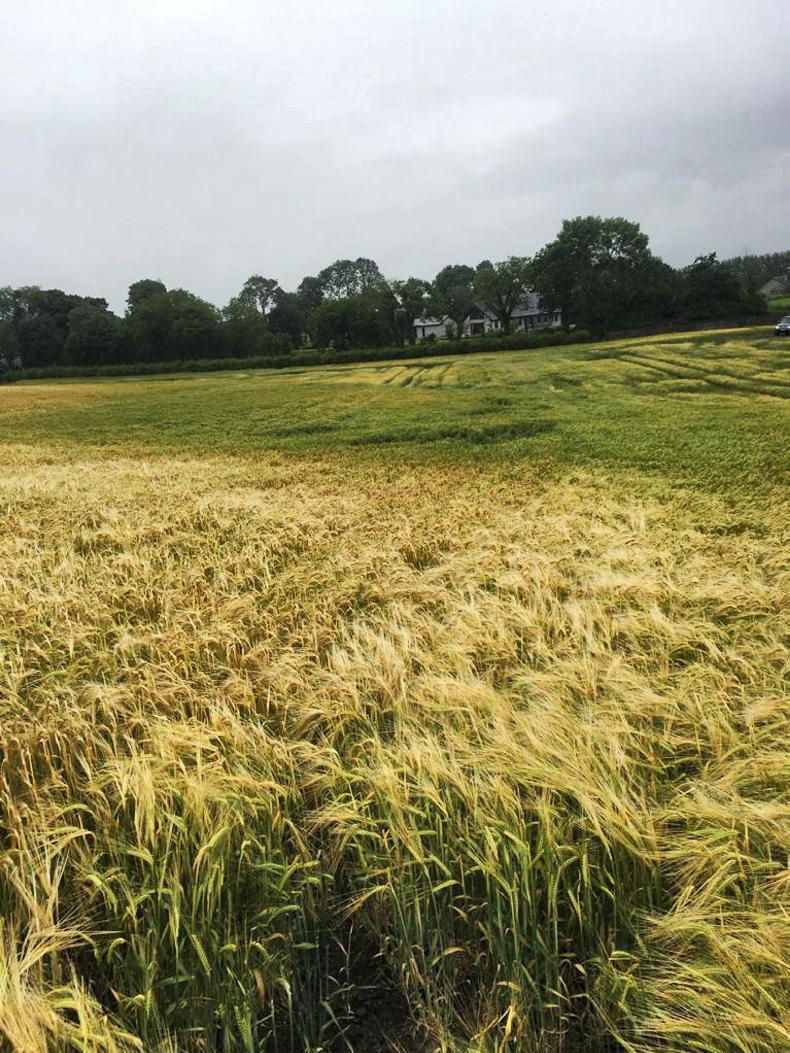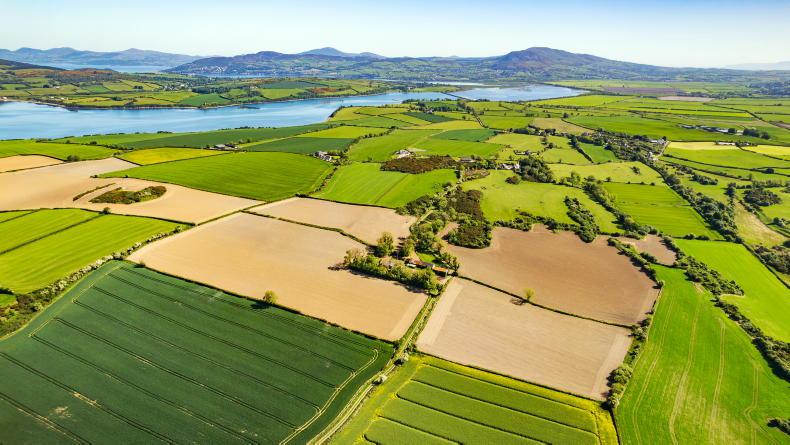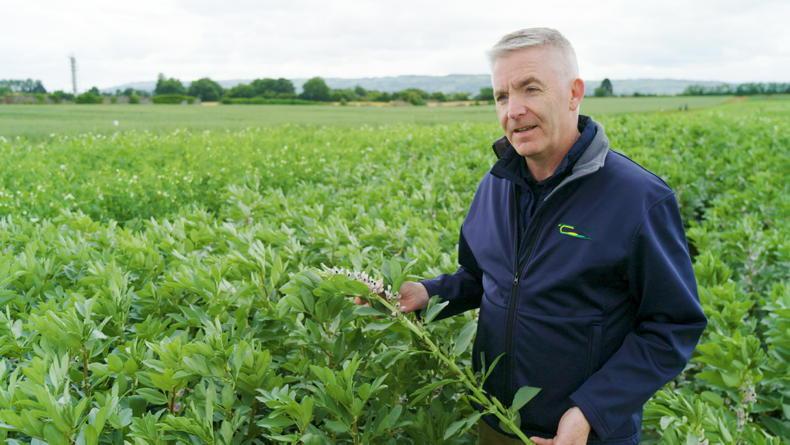Lismore,
Co Waterford
These few weeks are the calm before the storm, says Philip. Harvest 2020 is now only a matter of weeks away. Despite initially thinking an early harvest was on the cards, the cool, damp weather has slowed the pace of crop ripening in Waterford. It now looks like it will be mid-July before his winter barley harvest commences.

Crows are making inroads in Philip's field of Pixel winter barley.
Philip’s winter barley is looking good, although birds have begun their annual pre-harvest assault on standing crops. Thin areas on headlands and wet spots are proving to be the perfect entry point for them this year.
His spring barley crops have turned a darker shade of green in response to the recent rain. Philip notes that this could be due to a late flush of nitrogen. As the crop is destined for feed, he is not worried about the implications on protein content. He does note his fear of spring barley crops lodging due to the rain, however.
The crops received a head spray three weeks ago of either Siltra Xpro (0.5l/ha) or Ceriax (1.5l/ha), plus a multisite fungicide (1l/ha).
Disease pressure remains low. His spring oats are also looking quite good
Philip thinks that his winter wheat crops are attempting to compensate for a low plant population, as the heads are large in size. Ultimately however, he won’t know the full extent of the damage caused by the wet winter until the combine enters the field. Three weeks ago, the crop received a head spray of Prosaro (0.8l/ha) and a multisite fungicide (1l/ha).
He opted for a two spray fungicide programme on his winter oats this year and is happy with that choice. Disease pressure remains low. His spring oats are also looking quite good. They recently received a head spray of Elatus Plus (0.5l/ha), as well as Epso Combitop (3kg/ha).
Philip had to apply a follow up herbicide of Sniper (1.3l/ha) on to his Conveso Smart sugar beet crops. The single 1l/ha application of the Conviso One herbicide failed to control some chickweed. He also had to apply Vivendi (0.5l/ha) for Mayweed and Falcon (1.5l/ha) for Canary grass control in select locations in his other conventional beet crops. Both his conventional and Conveso beet varieties are progressing very well.
Bangor,
Co Down
The rain that fell on David’s farm over the past few weeks has been welcomed by all crops. However, amounts have been relatively small, as he continues to miss the majority of the heavy showers in the area.
While more moisture would be welcomed, crops are no longer under significant drought stress. Grass growth has kicked into gear on David’s farm and cereals are greener in colour.

David's spring barley crops look green, clean and healthy.
His winter barley harvest is now expected to commence around 20 July, which is normal for him. The crop continues to stand with little lodging. Most of his winter barley crops were sown on very dry ground, so the moisture was badly needed to slow down ripening.
David’s spring barley crops are looking green, healthy and have decent-sized heads. Disease pressure remains low. He applied a T2 fungicide onto the crops earlier this week. The tank mix consisted of Proline (0.3l/ha), Swift (0.15l/ha) and Bittersalts (2kg/ha), as well as a copper-based trace element spray (0.4l/ha).
David didn’t apply a disease head spray on his winter oat crops this season, as he felt pressure was too low. He is happy with this decision, as the crops remain clean. They are somewhat short however, likely stunted by drought stress earlier in the season.
He isn’t planning on burning off his winter oilseed rape crops until around 13 July, as the rain has slowed down ripening
He hopes the moisture will assist with grain fill in his winter wheat crops. He is happy with the size of the heads, as they are slightly larger than normal. The crop is short however. On 15 June, David applied a head spray of Taboo (0.5l/ha), as well as Bittersalts (2kg/ha) and a zinc-based trace element spray (0.5l/ha).
He isn’t planning on burning off his winter oilseed rape crops until around 13 July, as the rain has slowed down ripening. Elsewhere, he finished harvesting the second cut of silage this week and yields were reasonable.
Preparation for harvest 2020 continues. David is currently preparing grain stores by either blowing them out or power washing before applying an insecticide.
Delvin,
Co Westmeath
Pressure for moisture for crops has all but disappeared in Delvin after high levels of rainfall over the past few weeks. Crops are looking very well as a result, with the exception of a small amount of lodging in winter barley. Despite the rainfall, Donal notes that the water levels in streams are still well below normal for the time of year.

A tough year for Donal's Valerie winter barley with bare patches due to November rains, brown patches due to May heatwave, and lodging due to heavy June showers
His winter barley crops have “jammed on the brakes” and now likely won’t be ripe until around 23 July, slightly later than normal. His Cassia looks quite good, but his Valerie continues to look poorly. He will be happy if this crop yields 2t/ac. With the exception of a small amount of rhynco, these crops had an easy year for disease pressure.
Donal’s winter wheat crops received a head spray on 23 July and look healthy and strong. The T3 for his feed crops consisted of Variano Xpro (1.5l/ha) and Phoenix (1l/ha), while his seed crops received Prosaro (0.65l/ha) and Gleam (0.3l/ha). Crops also received an application of Super K trace elements.
He is very happy with the condition of his winter oats and they remain very green and lush. On 8 June, they received an application of Velogy Era (0.6l/ha) and Comet (0.4l/ha). The crops also received an application of the seaweed-based nutrient spray Phylgreen.
His spring barley crops received a head spray on 15 June, consisting of Comet (0.7l/ha) and Decoy (0.7l/ha), as well as Phoenix (1l/ha) and Super K (3l/ha). Donal says the crops on heavier ground, which looked poorly in spring, are now the best looking spring barley crops he has.
Volunteer oilseed rape in his spring bean crops has now become too strong for spraying
His spring oats are looking very good, having received their final fungicide last week. The tank mix consisted of Comet (0.5l/ha) and Decoy (0.5l/ha), as well as Mag Phos K (2l/ha).
Volunteer oilseed rape in his spring bean crops has now become too strong for spraying. He did apply Nirvana earlier in the season, but thinks it was too dry to work effectively.
Finally, Donal noted the increased talk about straw inquiries in his area, in anticipation of good demand this season.
Lismore,
Co Waterford
These few weeks are the calm before the storm, says Philip. Harvest 2020 is now only a matter of weeks away. Despite initially thinking an early harvest was on the cards, the cool, damp weather has slowed the pace of crop ripening in Waterford. It now looks like it will be mid-July before his winter barley harvest commences.

Crows are making inroads in Philip's field of Pixel winter barley.
Philip’s winter barley is looking good, although birds have begun their annual pre-harvest assault on standing crops. Thin areas on headlands and wet spots are proving to be the perfect entry point for them this year.
His spring barley crops have turned a darker shade of green in response to the recent rain. Philip notes that this could be due to a late flush of nitrogen. As the crop is destined for feed, he is not worried about the implications on protein content. He does note his fear of spring barley crops lodging due to the rain, however.
The crops received a head spray three weeks ago of either Siltra Xpro (0.5l/ha) or Ceriax (1.5l/ha), plus a multisite fungicide (1l/ha).
Disease pressure remains low. His spring oats are also looking quite good
Philip thinks that his winter wheat crops are attempting to compensate for a low plant population, as the heads are large in size. Ultimately however, he won’t know the full extent of the damage caused by the wet winter until the combine enters the field. Three weeks ago, the crop received a head spray of Prosaro (0.8l/ha) and a multisite fungicide (1l/ha).
He opted for a two spray fungicide programme on his winter oats this year and is happy with that choice. Disease pressure remains low. His spring oats are also looking quite good. They recently received a head spray of Elatus Plus (0.5l/ha), as well as Epso Combitop (3kg/ha).
Philip had to apply a follow up herbicide of Sniper (1.3l/ha) on to his Conveso Smart sugar beet crops. The single 1l/ha application of the Conviso One herbicide failed to control some chickweed. He also had to apply Vivendi (0.5l/ha) for Mayweed and Falcon (1.5l/ha) for Canary grass control in select locations in his other conventional beet crops. Both his conventional and Conveso beet varieties are progressing very well.
Bangor,
Co Down
The rain that fell on David’s farm over the past few weeks has been welcomed by all crops. However, amounts have been relatively small, as he continues to miss the majority of the heavy showers in the area.
While more moisture would be welcomed, crops are no longer under significant drought stress. Grass growth has kicked into gear on David’s farm and cereals are greener in colour.

David's spring barley crops look green, clean and healthy.
His winter barley harvest is now expected to commence around 20 July, which is normal for him. The crop continues to stand with little lodging. Most of his winter barley crops were sown on very dry ground, so the moisture was badly needed to slow down ripening.
David’s spring barley crops are looking green, healthy and have decent-sized heads. Disease pressure remains low. He applied a T2 fungicide onto the crops earlier this week. The tank mix consisted of Proline (0.3l/ha), Swift (0.15l/ha) and Bittersalts (2kg/ha), as well as a copper-based trace element spray (0.4l/ha).
David didn’t apply a disease head spray on his winter oat crops this season, as he felt pressure was too low. He is happy with this decision, as the crops remain clean. They are somewhat short however, likely stunted by drought stress earlier in the season.
He isn’t planning on burning off his winter oilseed rape crops until around 13 July, as the rain has slowed down ripening
He hopes the moisture will assist with grain fill in his winter wheat crops. He is happy with the size of the heads, as they are slightly larger than normal. The crop is short however. On 15 June, David applied a head spray of Taboo (0.5l/ha), as well as Bittersalts (2kg/ha) and a zinc-based trace element spray (0.5l/ha).
He isn’t planning on burning off his winter oilseed rape crops until around 13 July, as the rain has slowed down ripening. Elsewhere, he finished harvesting the second cut of silage this week and yields were reasonable.
Preparation for harvest 2020 continues. David is currently preparing grain stores by either blowing them out or power washing before applying an insecticide.
Delvin,
Co Westmeath
Pressure for moisture for crops has all but disappeared in Delvin after high levels of rainfall over the past few weeks. Crops are looking very well as a result, with the exception of a small amount of lodging in winter barley. Despite the rainfall, Donal notes that the water levels in streams are still well below normal for the time of year.

A tough year for Donal's Valerie winter barley with bare patches due to November rains, brown patches due to May heatwave, and lodging due to heavy June showers
His winter barley crops have “jammed on the brakes” and now likely won’t be ripe until around 23 July, slightly later than normal. His Cassia looks quite good, but his Valerie continues to look poorly. He will be happy if this crop yields 2t/ac. With the exception of a small amount of rhynco, these crops had an easy year for disease pressure.
Donal’s winter wheat crops received a head spray on 23 July and look healthy and strong. The T3 for his feed crops consisted of Variano Xpro (1.5l/ha) and Phoenix (1l/ha), while his seed crops received Prosaro (0.65l/ha) and Gleam (0.3l/ha). Crops also received an application of Super K trace elements.
He is very happy with the condition of his winter oats and they remain very green and lush. On 8 June, they received an application of Velogy Era (0.6l/ha) and Comet (0.4l/ha). The crops also received an application of the seaweed-based nutrient spray Phylgreen.
His spring barley crops received a head spray on 15 June, consisting of Comet (0.7l/ha) and Decoy (0.7l/ha), as well as Phoenix (1l/ha) and Super K (3l/ha). Donal says the crops on heavier ground, which looked poorly in spring, are now the best looking spring barley crops he has.
Volunteer oilseed rape in his spring bean crops has now become too strong for spraying
His spring oats are looking very good, having received their final fungicide last week. The tank mix consisted of Comet (0.5l/ha) and Decoy (0.5l/ha), as well as Mag Phos K (2l/ha).
Volunteer oilseed rape in his spring bean crops has now become too strong for spraying. He did apply Nirvana earlier in the season, but thinks it was too dry to work effectively.
Finally, Donal noted the increased talk about straw inquiries in his area, in anticipation of good demand this season.













SHARING OPTIONS